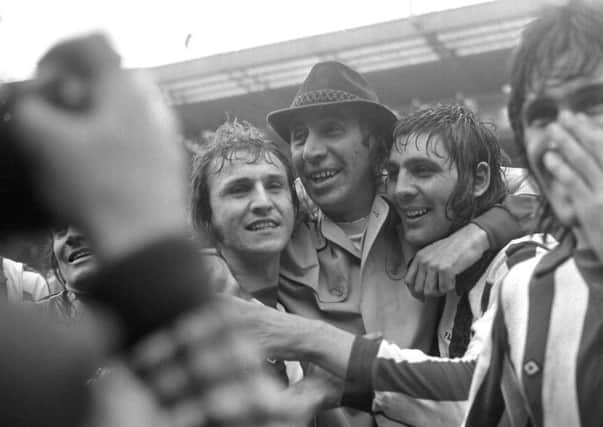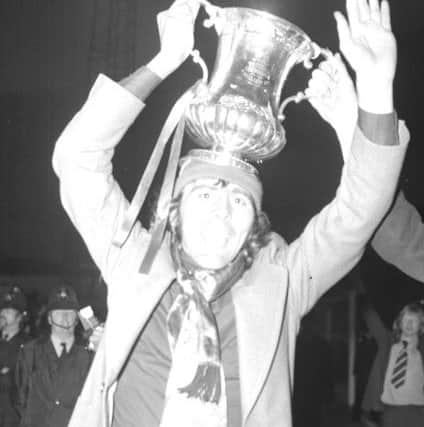Ian Porterfield heads into Raith Rovers' Hall Of Fame


And later this year he will be inducted into Raith Rovers’ Hall Of Fame.
Porterfield, who died in 2007, is the first big name to be confirmed for the 2018 show which takes place at the Adam Smith Theatre, Kirkcaldy on Monday, November 11.
Advertisement
Hide AdAdvertisement
Hide AdThe show will celebrate his remarkable career a player and manager which saw him become a hero in Sunderland and also Zambia where he rebuilt the national team after a dreadful air tragedy.


Born in Dunfermline and raised in Lochgelly, Porterfield was an elegant midfielder whose links to Rovers cropped up more than once during his wide-ranging career.
As a teenager, he went to Leeds United on trial, but returned, homesick, and signed for Rovers.
He played 153 games and netted 22 goals during his stay at Stark’s Park – returns that were good enough to tempt Sunderland to pay £45,000 for him in 1967.
Advertisement
Hide AdAdvertisement
Hide AdThey spotted him while taking part in a match against a Fife Select – made up of players from Rovers, Dunfermline Athletic, East Fife and Cowdenbeath – in a benefit game for the Michael Colliery Disaster Fund played at East End Park.


Porterfield scored and set up two other goals in the 4-2 win.
The select side was managed by George Farm who had recently left Stark’s Park to take over at Dunfermline, and the game attracted a crowd of 8713 to help the families of the nine miners who lost their lives in the terrible colliery fire.
Porterfield was brought to the Black Cats to replace another Raith legend, one Jim Baxter, who had moved on to Nottingham Forest.
Advertisement
Hide AdAdvertisement
Hide AdAnd it was in 1973 that he became a folk hero as the then Second Division Sunderland embarked on a famous run all the way to Wembley where they met Don Revie’s legendary leeds United team.
Porterfield’s goal secured one of the greatest shocks in the history of the tournament, and the images of him and manager Bob Stokoe celebrating have become part of FA Cup folklore.
It was a moment that put him on the radar of the Scottish national team, but a dreadful car crash just 12 months later changed the course of his career.
Porterfield was fortunate to escape with a fractured skull and broken jaw, but many said he was never the same player.
Advertisement
Hide AdAdvertisement
Hide AdAfter 250 games with the Black Cats he went on to play with Reading and then Sheffield Wednesday before hanging up his boots i1n 1979.
As a manager, Porterfield endured highs and lows, criss-crossing the country and working abroad.
He enjoyed instant success, guiding Reading to promotion in Division Three, and then dragged Sheffield United from Division Four to the second tier before accepting the daunting task of replacing the legendary Alex Ferguson at Aberdeen.
The Dons were on the crest of a wave with success at home and in Europe, and the return to Scotland wasn’t a success – Porterfield went back south, and resurfaced at Chelsea and then a brief spell as assistant to Colin Todd, a former Sunderland team-mate, at Bolton.
Advertisement
Hide AdAdvertisement
Hide AdPorterfield headed abroad on an adventure, working in Korea, Oman, Zimbabwe, Saudi Arabia and the Caribbean where his Rovers’ story was rekindled as he worked with a young Marvin Andrews, another Raith Hall of Fame inductee.
But his biggest success came in Zambia in 1993, his first port of call after quitting the UK football scene.
Porterfield was given the tough task of rebuilding the national team after an appalling air crash had claimed the lives of many top players.
Within a year he had guided the country to within one goal of the 1994 World Cup in the USA, and was awarded the Freedom of Zambia.
Advertisement
Hide AdAdvertisement
Hide AdA decade later he led Korean team, Busan i’Park to national cup glory before returning to Europe where a spell at the helm of Armenia co-incided with treatment for colon cancer.
He continued to work in between chemotherapy sessions but returned to the UK for on-going treatment before passing away aged just 61.